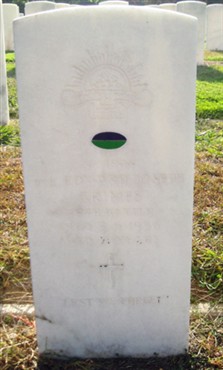Defending Villers-Bretonneux
contributed by Michael Hall
Ted Grimes was a labourer at Duntroon in 1916 when he enlisted. He served with the 35th Battalion on the Western Front when, in March 1918, the Germans pushed the British back towards the strategic village of Villers-Bretonneux on a plateau overlooking Amiens. Grimes and his battalion were rushed to the defence of the town on 30 March and spent the next four days holding the Germans just to the east of Villers-Bretonneux. On 4 April his company was in reserve, resting in the village when the Germans attacked. Grimes later wrote about it to his brother Ben: "Old Fritz made a big shove here lately, but he came a woeful buster and the D Coy played a prominent part in stopping him. We had about six hours sleep in a fortnight on account of trying to head him off, and when at last we took up a stand (on 30 March) our Coy were four days and nights in the cold and rain holding the position. At last they were relieved one night (on 3 April) and we went back to a village (Villers-Bretonneux) for a rest and feed. Fritz was shelling us pretty hot too, so we all got into cellars for cover, and lo, and behold he shoved our men back next morning (4 April).” “The Germans were coming right into town when we got the command to stand to for street fighting. It seemed a forlorn hope as we were all done up. We sprang to attention and fixed bayonets. As we ran, just a company of us, we met the Hun on the ridge just outside the town and got into them. They stuck into us with their machine guns and rifles, but we advanced, and when they saw we were determined they turned and started to retreat. When the Tommies on our right and the cavalry on our left, saw this they were dumbfounded; but they turned with us and charged. The yell we put up frightened the wits out of Fritz and my word he did scamper. Any way we put him right back where he started from. Both sides lost heavily, but the Germans suffered the biggest loss, dead and wounded lying all over the fields. “Well Ben, I suppose you will be a bit surprised to see me writing like this as I am mostly pretty quiet about things here, but we were told we could speak of our good work as long as we did not mention names of places. I advanced all the while right in the face of a machine gun, and tried my best to knock Fritz out, but I had no luck as he got away. The poor lads fell in front of me, behind me, on both left and right, but thank God, I never received a scratch. Strange to say I never thought of myself or my life - all I thought of was that machine gunner. Anyhow, Fritz is sending over some big stuff again. He just killed one poor chap in the street, so I will switch off”. Morley Brown from Hall served with Grimes but was mortally wounded that day. Grimes himself was wounded in action during a German gas attack a couple of weeks later and returned to Australia where he was discharged medically unfit. He lived in Canberra after the war in Griffith and Kingston and died in 1956. He is buried in the ex-servicemen’s portion of Woden Cemetery. |  |

